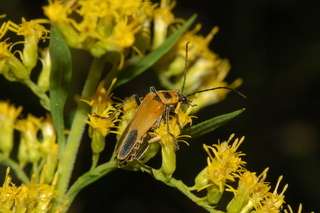Adaptation
Cantharidae are found throughout the world. Only 200 species are detected in the United States of America, while 1,500 species are located elsewhere. In Wisconsin, the most common Cantharidae is the Pennsylvania Leatherwing, (Chauliognathus pennsylvanicus). They are found in fields and on flowers, primarily goldenrod, preparing to feast on nutrient rich nectar. (White 1983)
The soldier beetle is very small in size, with a length of 9-12 mm due to its environment on goldenrod plants. They have an orange-yellow colored pronotum, which is the hard covering of the first thoracic segment, in order to blend in and camouflage themselves amongst the buds of the goldenrod. (Swain 1948) These beetles have leathery, veinless wings that are very durable against harm or danger and have gained this species the nickname of "leatherwing". (Eisner 2005)
The soldier beetle secretes a white fluid that is released from its glands when it feels threatened and seems to be a defense mechanism against predators. This fluid contains (Z)-dihydromatricaria acid and an acytlenic compound. Researchers have not found out whether this fluid is gained from the plant that the beetle feeds on or if the beetle actually produces the compound within its body. (Eisner 2005)
